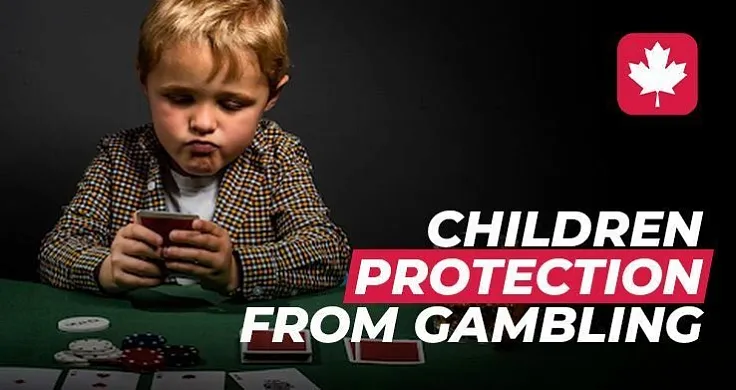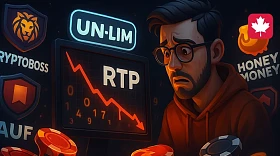
Children protection from Gambling
In all of the world, the legal gambling age is either 18 or 21. So, you might be asking how gambling among children might be an issue. The prevalence of juvenile gambling addiction and the impact that free mobile games may have on it may surprise you.
Many apparently kid-friendly internet games may feature gambling themes or content that encourages playing for real money.
Children gamble for a variety of reasons, including to get away from their regular life. When school and home life become too demanding, however, kids can take additional measures to reduce stress and strengthen their immune systems.
Kids may become addicted to gambling because it makes them feel happy when dopamine, a feel-good chemical, is released in their brains. Therefore, it might be challenging to stop gambling when a natural "high" turns into addiction.
How Children Become Gambling Addicts

Children may become addicted to internet or mobile games before they start gambling. Children may play their preferred online game whenever and wherever they want thanks to the internet and mobile technology.
These games frequently involve little skill and have a chance component. Children's attention can be held for a very long period by such qualities.
It's possible for mobile games to feature innocent themes like candy prizes and virtual pets.
Here is the issue. These games might make gamblers feel the same sensations and exhilaration.
Dopamine is a chemical that the brain produces in large amounts, and studies have linked this to higher levels of subjective excitement and gambling behavior. The central nervous system's signaling chemicals are called neurotransmitters (CNS)
Additionally, the internet and television might act as reinforcements to encourage gambling among children. Children might see advertisements for gambling on TV or on websites that provide gambling, for instance.
Offline gambling opportunities for children include card games, scratch cards, and lottery tickets.
Then they might switch to other, riskier gaming activities. Children might begin betting on horse races, other sports, or online casino games, for instance.
In free online game "practice mode," young people will occasionally engage in gambling. Such games might appeal to them as a quick method to become wealthy while having fun.
Numerous mobile and internet gambling games may resemble video games, which is another factor. Therefore, kids could believe that if they only get better at gambling, they can overcome the odds and get money.
Guidelines for Preventing Addiction in Young Gamblers

The following are some techniques to aid in preventing a child's addiction to gambling:
-
Describe how gambling works.
-
Older elementary school students could be curious to learn about gambling, especially their long-term odds of success.
-
According to one idea, children begin to develop abstract thinking at the age of twelve, when they enter the formal operational stage.
-
One strategy is to highlight the absurdly high likelihood of winning. For instance, your chances of winning a sizable lottery jackpot outweigh your chances of being struck by lightning in your lifetime.
-
Another strategy is to discuss gambling's business aspects. For instance, Las Vegas casinos continue to operate because they generate more revenue than they expend. Even when players lose bets, gaming businesses continue to make money.
-
Think about the behaviours and attitudes in your family.
-
Children who are exposed to gambling in your home may develop an interest in it.
For instance, if parents gamble, their kids could see it as acceptable behaviour and try to imitate it.
Imagine if they witness their parents playing video poker, placing bets on basketball or football games, or purchasing lottery tickets. Children might wish to behave just like their parents do. They might believe that gambling is a fun or lucrative activity. You have the power to set a positive or negative example for your kids as a parent.
FAQ
A prevalence of 1.14% for adults was discovered by a meta-analysis of adult gambling surveys.
There are three basic approaches to treating gambling issues: counselling, medication, and support groups. A person can uncover mental patterns that contribute to and sustain a gambling addiction using cognitive behavioural therapy and behaviour therapy, and they can then replace these patterns with more wholesome ideas.
The likelihood of missing class, receiving poor grades, or dropping out rises with serious gambling addictions. As a result, they jeopardize future growth, academic accomplishment, and professional success. The threat of substance abuse among young people who gamble poses an even higher danger, according to studies.





tickscollar All this bullshit was invented to squeeze out the last money. It used to be easier - bet on red, win or lose. And now some chickens are running, airplanes are flying... Circus.


xSuiZ The article is fire! Everything was laid out according to the facts. Drake is not a ludomaniac, he is a walking advertisement. And while the suckers believe in his "curse", Stake rakes in the money. Beautiful, you can't say anything. I've been riding a steak myself for a year now, I threw in crypto and generally don't give a about all the blocking.


Leoak Finally a good article on NC! I've been playing them since the very beginning, since the first Deadwood. Yes, their dispersion is crazy, you can lose a deposit in 100 spins. But when he pours ... It's worth it. In Mental x15k I caught, I still remember this spin. The whole point is in their x-mechanics, they really change the game, and not just for show.



tealblossom 2 minutes to respond? Yes, this is a dream! Otherwise, while you wait for these operators, you will already want to play. It's high time!










































